Critical Analysis: Organisational Culture and Nursing Leadership
VerifiedAdded on 2022/10/16
|9
|1966
|83
Essay
AI Summary
This essay provides a comprehensive analysis of organisational culture within the context of nursing leadership. It begins by defining organisational culture and discussing its significance in healthcare settings. The essay then delves into both internal and external factors that influence the formation of organisational culture, providing relevant nursing examples to illustrate these concepts. Furthermore, the essay critically examines the relationship between organisational culture and leadership styles, exploring various leadership approaches and their impact on the healthcare environment. Key aspects of nursing management, including delegation, change management, and conflict resolution strategies, are also critiqued, highlighting their importance in fostering a positive and effective organisational culture. The essay emphasizes the importance of leadership concepts, skills, and decision-making in providing quality nursing care, coordinating healthcare teams, and ensuring accountability across diverse settings. Through a detailed examination of these elements, the essay aims to demonstrate how organisational culture shapes the delivery of healthcare services and influences patient outcomes. The essay utilizes examples from the provided assignment solution to support the analysis.
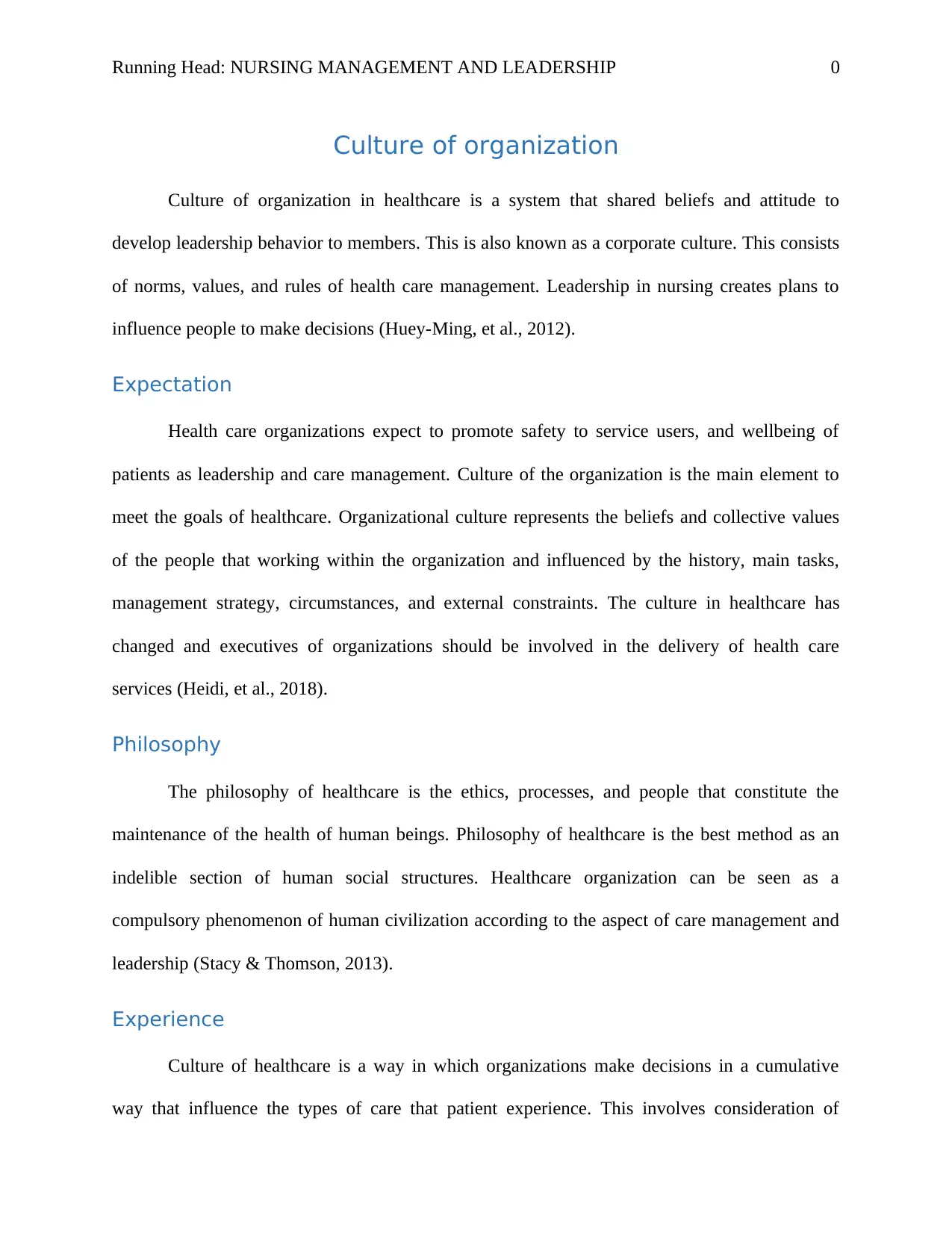
Running Head: NURSING MANAGEMENT AND LEADERSHIP 0
Culture of organization
Culture of organization in healthcare is a system that shared beliefs and attitude to
develop leadership behavior to members. This is also known as a corporate culture. This consists
of norms, values, and rules of health care management. Leadership in nursing creates plans to
influence people to make decisions (Huey-Ming, et al., 2012).
Expectation
Health care organizations expect to promote safety to service users, and wellbeing of
patients as leadership and care management. Culture of the organization is the main element to
meet the goals of healthcare. Organizational culture represents the beliefs and collective values
of the people that working within the organization and influenced by the history, main tasks,
management strategy, circumstances, and external constraints. The culture in healthcare has
changed and executives of organizations should be involved in the delivery of health care
services (Heidi, et al., 2018).
Philosophy
The philosophy of healthcare is the ethics, processes, and people that constitute the
maintenance of the health of human beings. Philosophy of healthcare is the best method as an
indelible section of human social structures. Healthcare organization can be seen as a
compulsory phenomenon of human civilization according to the aspect of care management and
leadership (Stacy & Thomson, 2013).
Experience
Culture of healthcare is a way in which organizations make decisions in a cumulative
way that influence the types of care that patient experience. This involves consideration of
Culture of organization
Culture of organization in healthcare is a system that shared beliefs and attitude to
develop leadership behavior to members. This is also known as a corporate culture. This consists
of norms, values, and rules of health care management. Leadership in nursing creates plans to
influence people to make decisions (Huey-Ming, et al., 2012).
Expectation
Health care organizations expect to promote safety to service users, and wellbeing of
patients as leadership and care management. Culture of the organization is the main element to
meet the goals of healthcare. Organizational culture represents the beliefs and collective values
of the people that working within the organization and influenced by the history, main tasks,
management strategy, circumstances, and external constraints. The culture in healthcare has
changed and executives of organizations should be involved in the delivery of health care
services (Heidi, et al., 2018).
Philosophy
The philosophy of healthcare is the ethics, processes, and people that constitute the
maintenance of the health of human beings. Philosophy of healthcare is the best method as an
indelible section of human social structures. Healthcare organization can be seen as a
compulsory phenomenon of human civilization according to the aspect of care management and
leadership (Stacy & Thomson, 2013).
Experience
Culture of healthcare is a way in which organizations make decisions in a cumulative
way that influence the types of care that patient experience. This involves consideration of
Paraphrase This Document
Need a fresh take? Get an instant paraphrase of this document with our AI Paraphraser
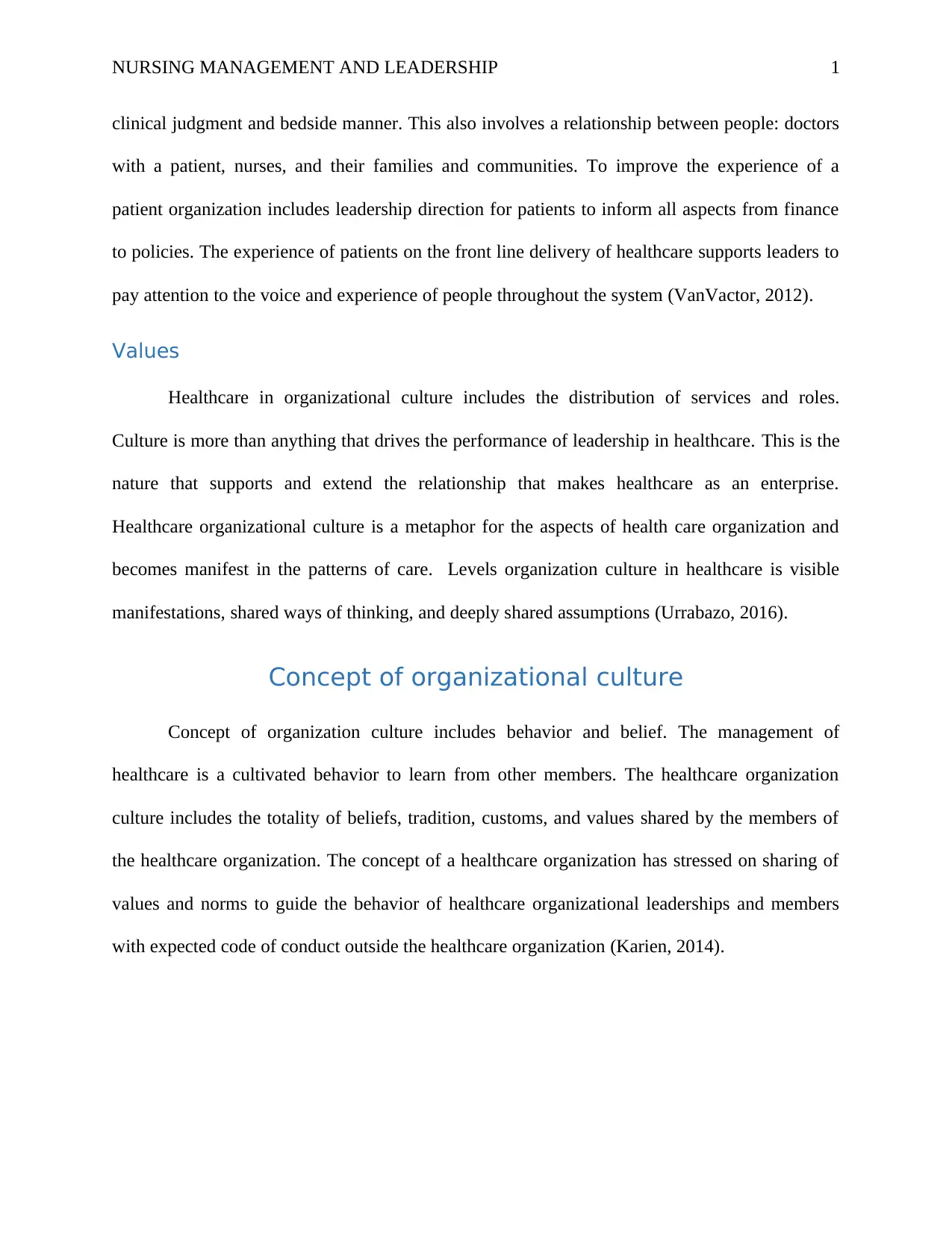
NURSING MANAGEMENT AND LEADERSHIP 1
clinical judgment and bedside manner. This also involves a relationship between people: doctors
with a patient, nurses, and their families and communities. To improve the experience of a
patient organization includes leadership direction for patients to inform all aspects from finance
to policies. The experience of patients on the front line delivery of healthcare supports leaders to
pay attention to the voice and experience of people throughout the system (VanVactor, 2012).
Values
Healthcare in organizational culture includes the distribution of services and roles.
Culture is more than anything that drives the performance of leadership in healthcare. This is the
nature that supports and extend the relationship that makes healthcare as an enterprise.
Healthcare organizational culture is a metaphor for the aspects of health care organization and
becomes manifest in the patterns of care. Levels organization culture in healthcare is visible
manifestations, shared ways of thinking, and deeply shared assumptions (Urrabazo, 2016).
Concept of organizational culture
Concept of organization culture includes behavior and belief. The management of
healthcare is a cultivated behavior to learn from other members. The healthcare organization
culture includes the totality of beliefs, tradition, customs, and values shared by the members of
the healthcare organization. The concept of a healthcare organization has stressed on sharing of
values and norms to guide the behavior of healthcare organizational leaderships and members
with expected code of conduct outside the healthcare organization (Karien, 2014).
clinical judgment and bedside manner. This also involves a relationship between people: doctors
with a patient, nurses, and their families and communities. To improve the experience of a
patient organization includes leadership direction for patients to inform all aspects from finance
to policies. The experience of patients on the front line delivery of healthcare supports leaders to
pay attention to the voice and experience of people throughout the system (VanVactor, 2012).
Values
Healthcare in organizational culture includes the distribution of services and roles.
Culture is more than anything that drives the performance of leadership in healthcare. This is the
nature that supports and extend the relationship that makes healthcare as an enterprise.
Healthcare organizational culture is a metaphor for the aspects of health care organization and
becomes manifest in the patterns of care. Levels organization culture in healthcare is visible
manifestations, shared ways of thinking, and deeply shared assumptions (Urrabazo, 2016).
Concept of organizational culture
Concept of organization culture includes behavior and belief. The management of
healthcare is a cultivated behavior to learn from other members. The healthcare organization
culture includes the totality of beliefs, tradition, customs, and values shared by the members of
the healthcare organization. The concept of a healthcare organization has stressed on sharing of
values and norms to guide the behavior of healthcare organizational leaderships and members
with expected code of conduct outside the healthcare organization (Karien, 2014).
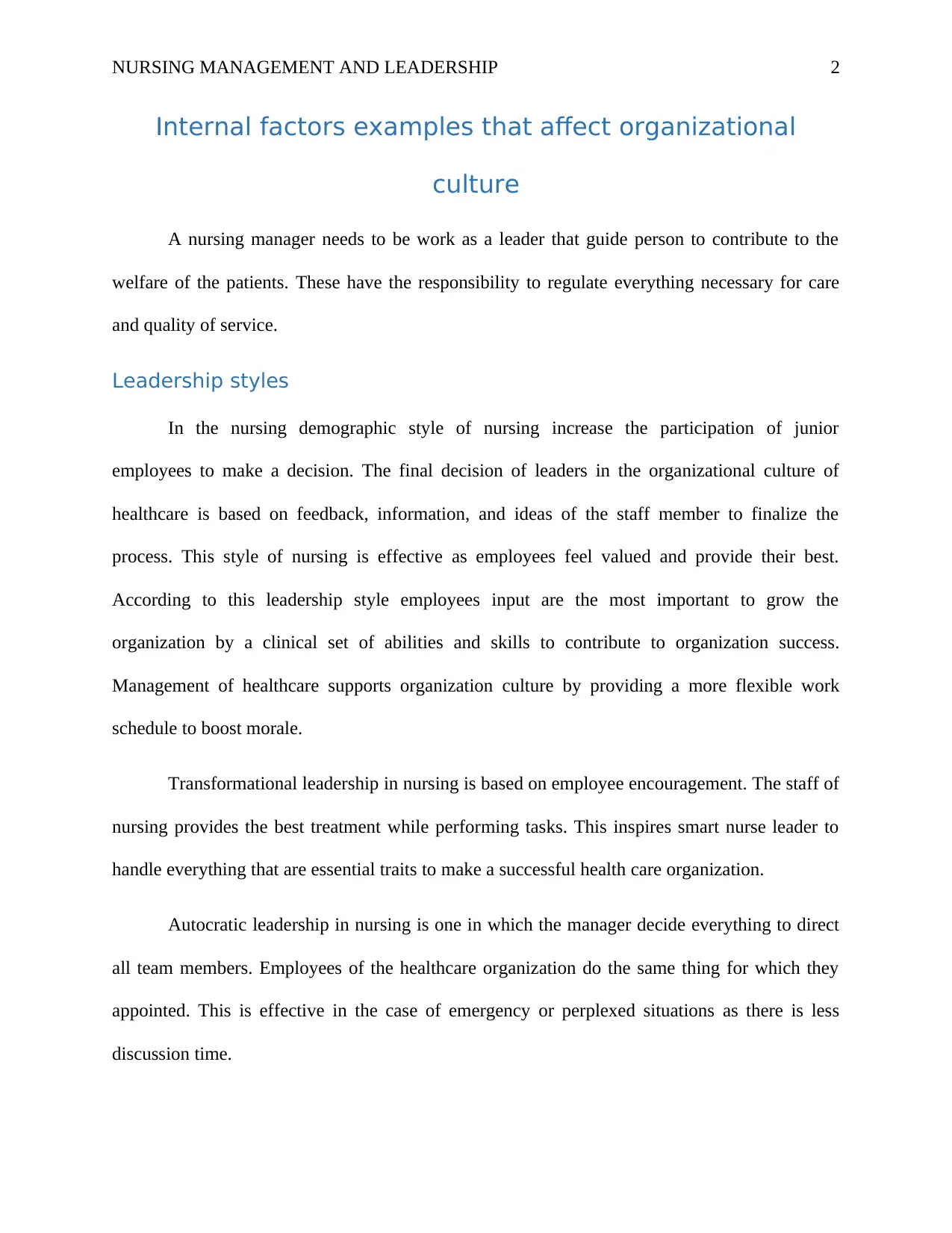
NURSING MANAGEMENT AND LEADERSHIP 2
Internal factors examples that affect organizational
culture
A nursing manager needs to be work as a leader that guide person to contribute to the
welfare of the patients. These have the responsibility to regulate everything necessary for care
and quality of service.
Leadership styles
In the nursing demographic style of nursing increase the participation of junior
employees to make a decision. The final decision of leaders in the organizational culture of
healthcare is based on feedback, information, and ideas of the staff member to finalize the
process. This style of nursing is effective as employees feel valued and provide their best.
According to this leadership style employees input are the most important to grow the
organization by a clinical set of abilities and skills to contribute to organization success.
Management of healthcare supports organization culture by providing a more flexible work
schedule to boost morale.
Transformational leadership in nursing is based on employee encouragement. The staff of
nursing provides the best treatment while performing tasks. This inspires smart nurse leader to
handle everything that are essential traits to make a successful health care organization.
Autocratic leadership in nursing is one in which the manager decide everything to direct
all team members. Employees of the healthcare organization do the same thing for which they
appointed. This is effective in the case of emergency or perplexed situations as there is less
discussion time.
Internal factors examples that affect organizational
culture
A nursing manager needs to be work as a leader that guide person to contribute to the
welfare of the patients. These have the responsibility to regulate everything necessary for care
and quality of service.
Leadership styles
In the nursing demographic style of nursing increase the participation of junior
employees to make a decision. The final decision of leaders in the organizational culture of
healthcare is based on feedback, information, and ideas of the staff member to finalize the
process. This style of nursing is effective as employees feel valued and provide their best.
According to this leadership style employees input are the most important to grow the
organization by a clinical set of abilities and skills to contribute to organization success.
Management of healthcare supports organization culture by providing a more flexible work
schedule to boost morale.
Transformational leadership in nursing is based on employee encouragement. The staff of
nursing provides the best treatment while performing tasks. This inspires smart nurse leader to
handle everything that are essential traits to make a successful health care organization.
Autocratic leadership in nursing is one in which the manager decide everything to direct
all team members. Employees of the healthcare organization do the same thing for which they
appointed. This is effective in the case of emergency or perplexed situations as there is less
discussion time.
⊘ This is a preview!⊘
Do you want full access?
Subscribe today to unlock all pages.

Trusted by 1+ million students worldwide
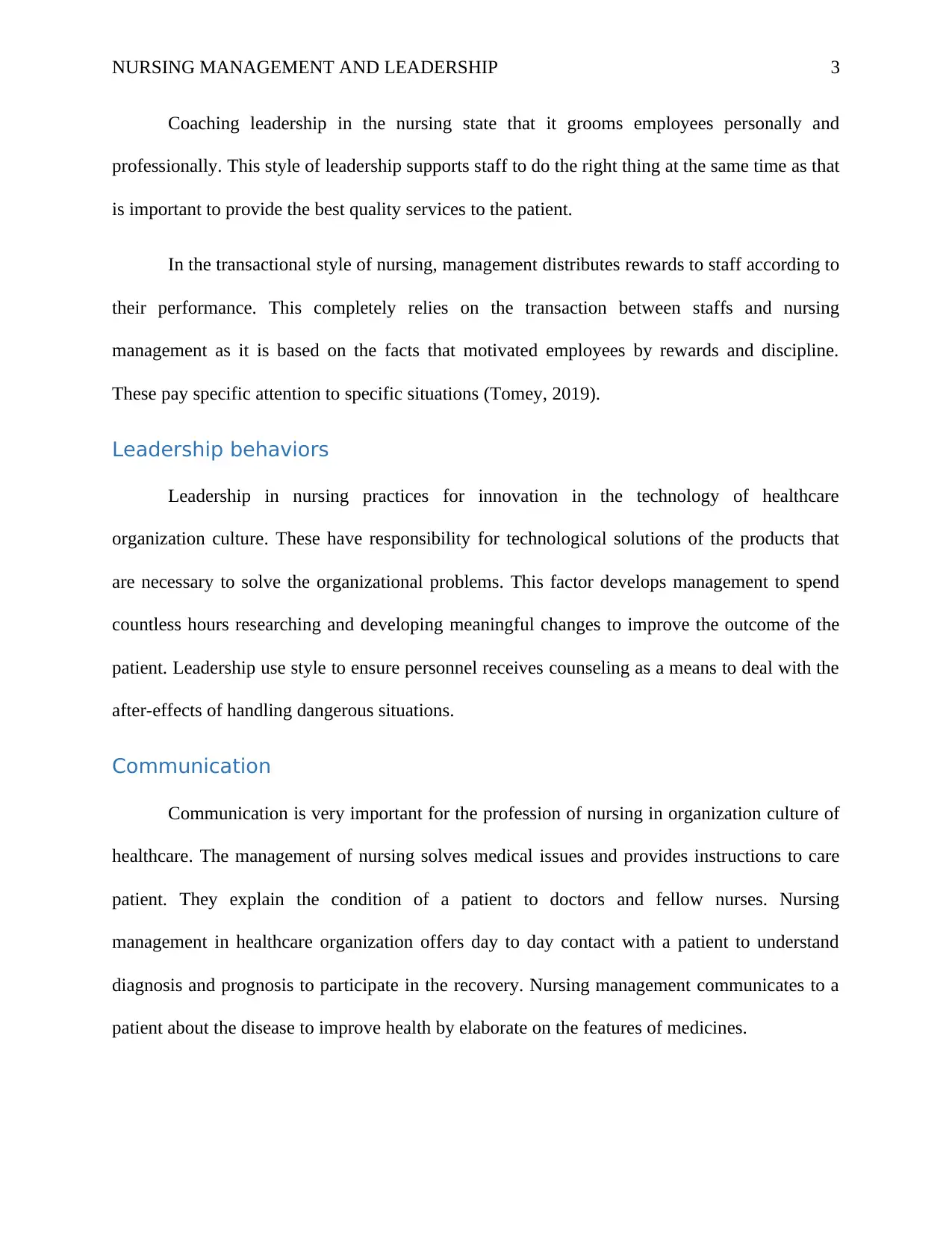
NURSING MANAGEMENT AND LEADERSHIP 3
Coaching leadership in the nursing state that it grooms employees personally and
professionally. This style of leadership supports staff to do the right thing at the same time as that
is important to provide the best quality services to the patient.
In the transactional style of nursing, management distributes rewards to staff according to
their performance. This completely relies on the transaction between staffs and nursing
management as it is based on the facts that motivated employees by rewards and discipline.
These pay specific attention to specific situations (Tomey, 2019).
Leadership behaviors
Leadership in nursing practices for innovation in the technology of healthcare
organization culture. These have responsibility for technological solutions of the products that
are necessary to solve the organizational problems. This factor develops management to spend
countless hours researching and developing meaningful changes to improve the outcome of the
patient. Leadership use style to ensure personnel receives counseling as a means to deal with the
after-effects of handling dangerous situations.
Communication
Communication is very important for the profession of nursing in organization culture of
healthcare. The management of nursing solves medical issues and provides instructions to care
patient. They explain the condition of a patient to doctors and fellow nurses. Nursing
management in healthcare organization offers day to day contact with a patient to understand
diagnosis and prognosis to participate in the recovery. Nursing management communicates to a
patient about the disease to improve health by elaborate on the features of medicines.
Coaching leadership in the nursing state that it grooms employees personally and
professionally. This style of leadership supports staff to do the right thing at the same time as that
is important to provide the best quality services to the patient.
In the transactional style of nursing, management distributes rewards to staff according to
their performance. This completely relies on the transaction between staffs and nursing
management as it is based on the facts that motivated employees by rewards and discipline.
These pay specific attention to specific situations (Tomey, 2019).
Leadership behaviors
Leadership in nursing practices for innovation in the technology of healthcare
organization culture. These have responsibility for technological solutions of the products that
are necessary to solve the organizational problems. This factor develops management to spend
countless hours researching and developing meaningful changes to improve the outcome of the
patient. Leadership use style to ensure personnel receives counseling as a means to deal with the
after-effects of handling dangerous situations.
Communication
Communication is very important for the profession of nursing in organization culture of
healthcare. The management of nursing solves medical issues and provides instructions to care
patient. They explain the condition of a patient to doctors and fellow nurses. Nursing
management in healthcare organization offers day to day contact with a patient to understand
diagnosis and prognosis to participate in the recovery. Nursing management communicates to a
patient about the disease to improve health by elaborate on the features of medicines.
Paraphrase This Document
Need a fresh take? Get an instant paraphrase of this document with our AI Paraphraser
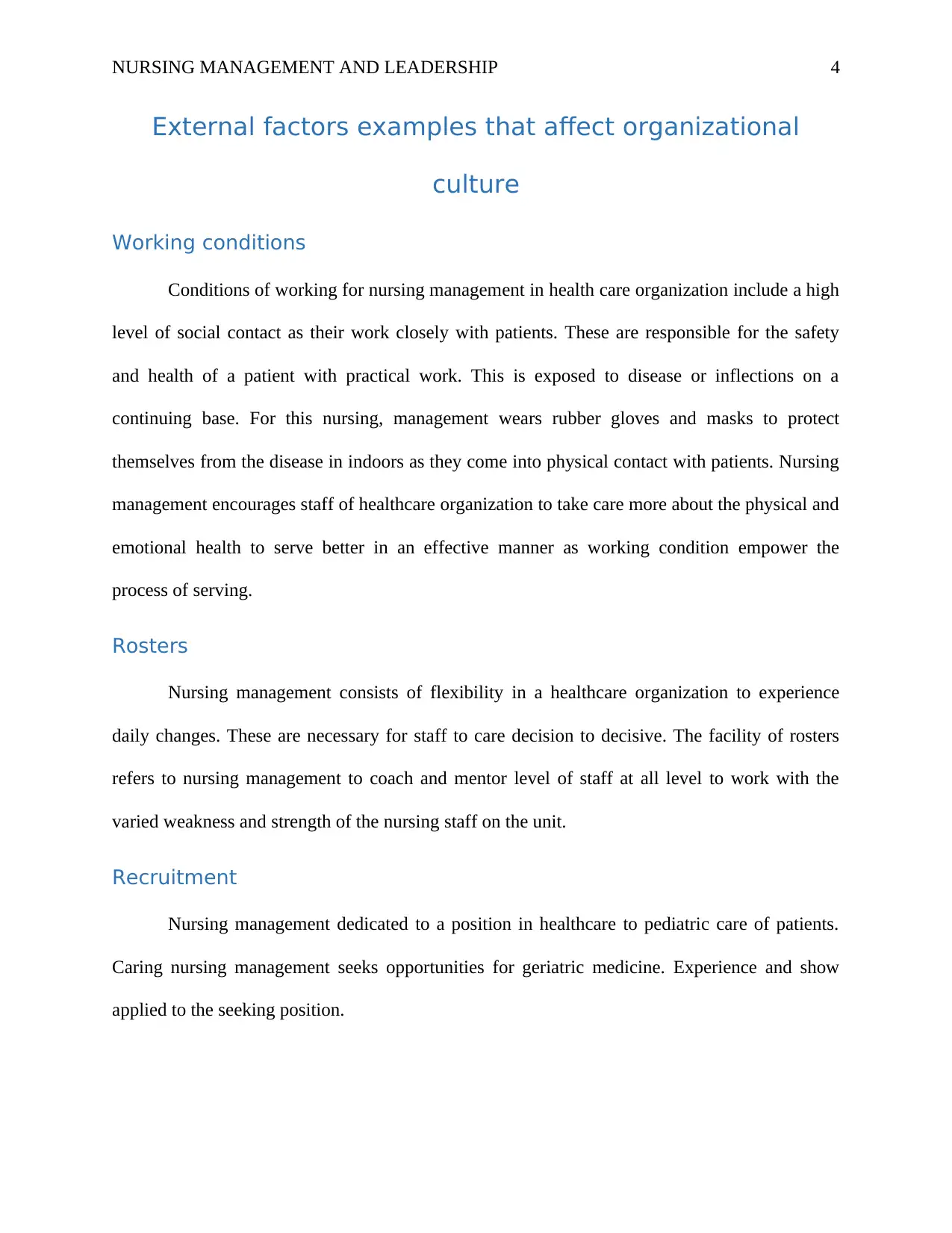
NURSING MANAGEMENT AND LEADERSHIP 4
External factors examples that affect organizational
culture
Working conditions
Conditions of working for nursing management in health care organization include a high
level of social contact as their work closely with patients. These are responsible for the safety
and health of a patient with practical work. This is exposed to disease or inflections on a
continuing base. For this nursing, management wears rubber gloves and masks to protect
themselves from the disease in indoors as they come into physical contact with patients. Nursing
management encourages staff of healthcare organization to take care more about the physical and
emotional health to serve better in an effective manner as working condition empower the
process of serving.
Rosters
Nursing management consists of flexibility in a healthcare organization to experience
daily changes. These are necessary for staff to care decision to decisive. The facility of rosters
refers to nursing management to coach and mentor level of staff at all level to work with the
varied weakness and strength of the nursing staff on the unit.
Recruitment
Nursing management dedicated to a position in healthcare to pediatric care of patients.
Caring nursing management seeks opportunities for geriatric medicine. Experience and show
applied to the seeking position.
External factors examples that affect organizational
culture
Working conditions
Conditions of working for nursing management in health care organization include a high
level of social contact as their work closely with patients. These are responsible for the safety
and health of a patient with practical work. This is exposed to disease or inflections on a
continuing base. For this nursing, management wears rubber gloves and masks to protect
themselves from the disease in indoors as they come into physical contact with patients. Nursing
management encourages staff of healthcare organization to take care more about the physical and
emotional health to serve better in an effective manner as working condition empower the
process of serving.
Rosters
Nursing management consists of flexibility in a healthcare organization to experience
daily changes. These are necessary for staff to care decision to decisive. The facility of rosters
refers to nursing management to coach and mentor level of staff at all level to work with the
varied weakness and strength of the nursing staff on the unit.
Recruitment
Nursing management dedicated to a position in healthcare to pediatric care of patients.
Caring nursing management seeks opportunities for geriatric medicine. Experience and show
applied to the seeking position.
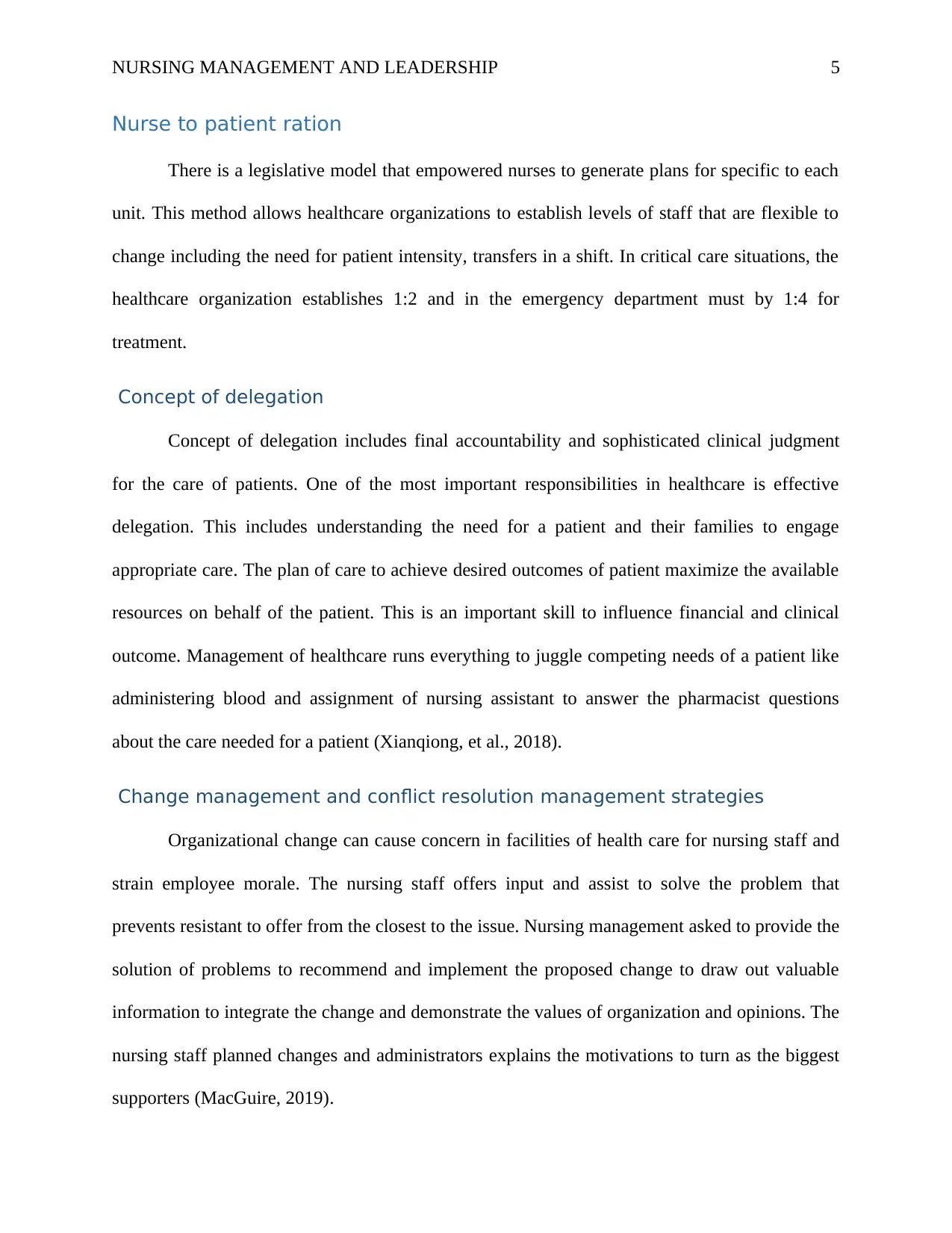
NURSING MANAGEMENT AND LEADERSHIP 5
Nurse to patient ration
There is a legislative model that empowered nurses to generate plans for specific to each
unit. This method allows healthcare organizations to establish levels of staff that are flexible to
change including the need for patient intensity, transfers in a shift. In critical care situations, the
healthcare organization establishes 1:2 and in the emergency department must by 1:4 for
treatment.
Concept of delegation
Concept of delegation includes final accountability and sophisticated clinical judgment
for the care of patients. One of the most important responsibilities in healthcare is effective
delegation. This includes understanding the need for a patient and their families to engage
appropriate care. The plan of care to achieve desired outcomes of patient maximize the available
resources on behalf of the patient. This is an important skill to influence financial and clinical
outcome. Management of healthcare runs everything to juggle competing needs of a patient like
administering blood and assignment of nursing assistant to answer the pharmacist questions
about the care needed for a patient (Xianqiong, et al., 2018).
Change management and conflict resolution management strategies
Organizational change can cause concern in facilities of health care for nursing staff and
strain employee morale. The nursing staff offers input and assist to solve the problem that
prevents resistant to offer from the closest to the issue. Nursing management asked to provide the
solution of problems to recommend and implement the proposed change to draw out valuable
information to integrate the change and demonstrate the values of organization and opinions. The
nursing staff planned changes and administrators explains the motivations to turn as the biggest
supporters (MacGuire, 2019).
Nurse to patient ration
There is a legislative model that empowered nurses to generate plans for specific to each
unit. This method allows healthcare organizations to establish levels of staff that are flexible to
change including the need for patient intensity, transfers in a shift. In critical care situations, the
healthcare organization establishes 1:2 and in the emergency department must by 1:4 for
treatment.
Concept of delegation
Concept of delegation includes final accountability and sophisticated clinical judgment
for the care of patients. One of the most important responsibilities in healthcare is effective
delegation. This includes understanding the need for a patient and their families to engage
appropriate care. The plan of care to achieve desired outcomes of patient maximize the available
resources on behalf of the patient. This is an important skill to influence financial and clinical
outcome. Management of healthcare runs everything to juggle competing needs of a patient like
administering blood and assignment of nursing assistant to answer the pharmacist questions
about the care needed for a patient (Xianqiong, et al., 2018).
Change management and conflict resolution management strategies
Organizational change can cause concern in facilities of health care for nursing staff and
strain employee morale. The nursing staff offers input and assist to solve the problem that
prevents resistant to offer from the closest to the issue. Nursing management asked to provide the
solution of problems to recommend and implement the proposed change to draw out valuable
information to integrate the change and demonstrate the values of organization and opinions. The
nursing staff planned changes and administrators explains the motivations to turn as the biggest
supporters (MacGuire, 2019).
⊘ This is a preview!⊘
Do you want full access?
Subscribe today to unlock all pages.

Trusted by 1+ million students worldwide
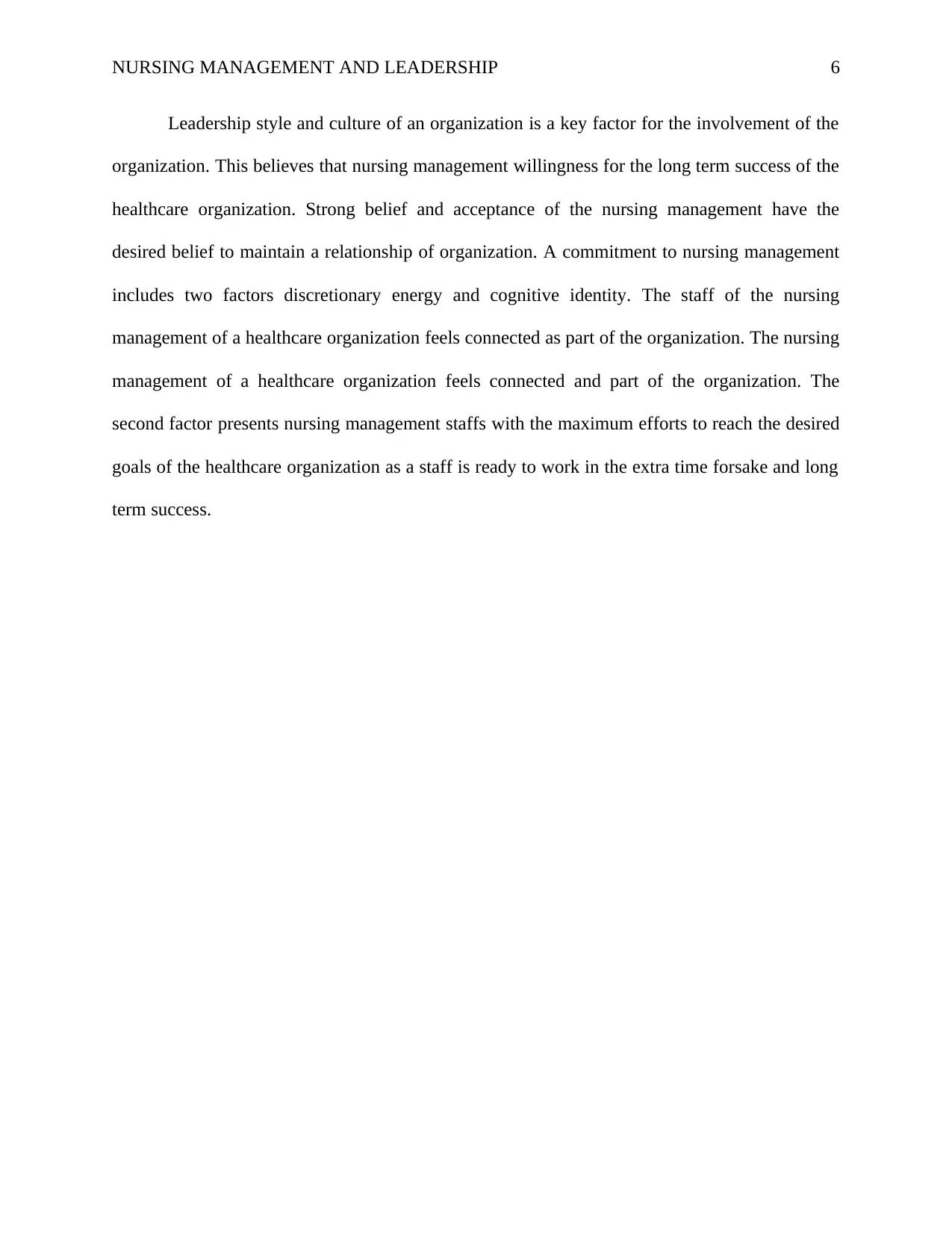
NURSING MANAGEMENT AND LEADERSHIP 6
Leadership style and culture of an organization is a key factor for the involvement of the
organization. This believes that nursing management willingness for the long term success of the
healthcare organization. Strong belief and acceptance of the nursing management have the
desired belief to maintain a relationship of organization. A commitment to nursing management
includes two factors discretionary energy and cognitive identity. The staff of the nursing
management of a healthcare organization feels connected as part of the organization. The nursing
management of a healthcare organization feels connected and part of the organization. The
second factor presents nursing management staffs with the maximum efforts to reach the desired
goals of the healthcare organization as a staff is ready to work in the extra time forsake and long
term success.
Leadership style and culture of an organization is a key factor for the involvement of the
organization. This believes that nursing management willingness for the long term success of the
healthcare organization. Strong belief and acceptance of the nursing management have the
desired belief to maintain a relationship of organization. A commitment to nursing management
includes two factors discretionary energy and cognitive identity. The staff of the nursing
management of a healthcare organization feels connected as part of the organization. The nursing
management of a healthcare organization feels connected and part of the organization. The
second factor presents nursing management staffs with the maximum efforts to reach the desired
goals of the healthcare organization as a staff is ready to work in the extra time forsake and long
term success.
Paraphrase This Document
Need a fresh take? Get an instant paraphrase of this document with our AI Paraphraser
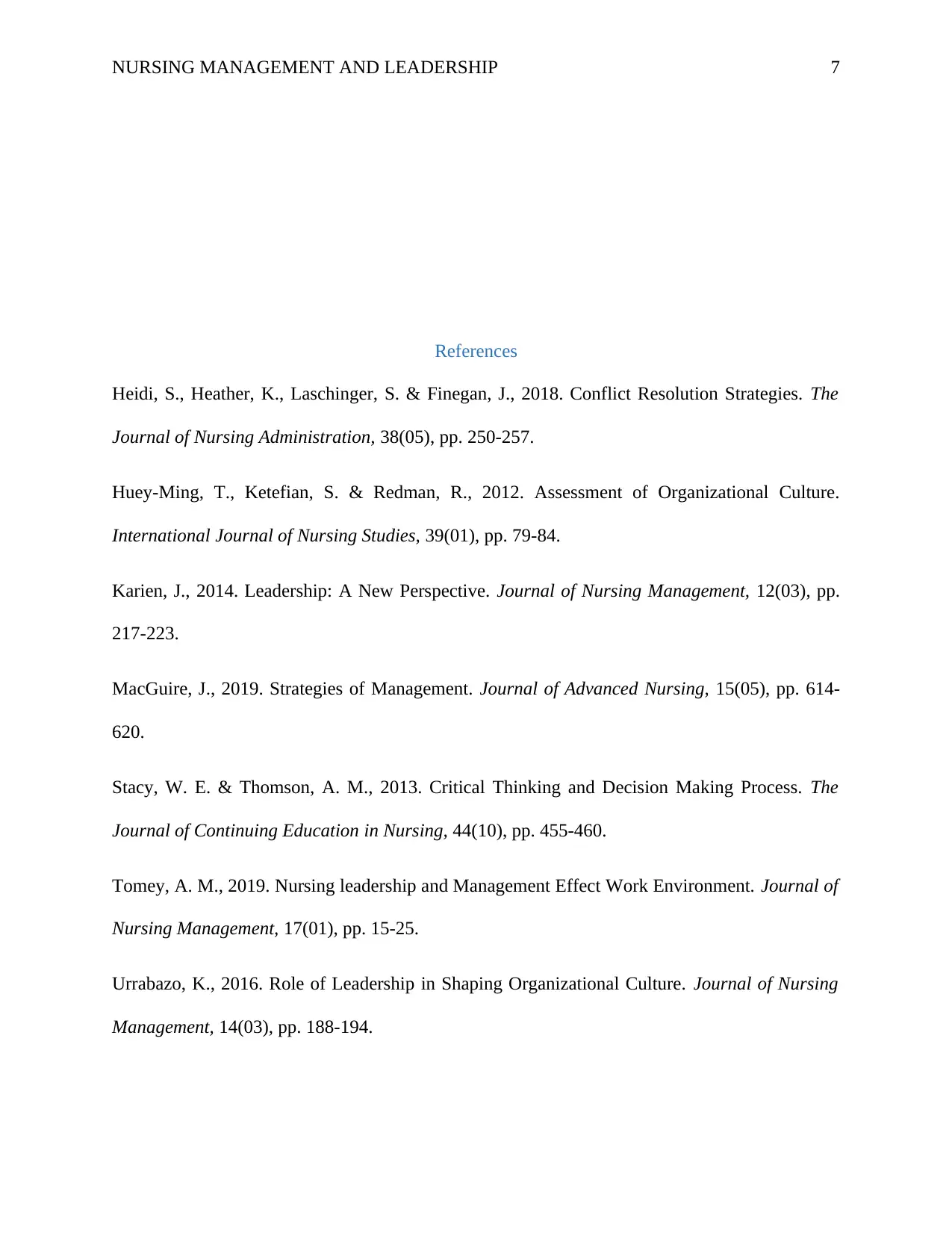
NURSING MANAGEMENT AND LEADERSHIP 7
References
Heidi, S., Heather, K., Laschinger, S. & Finegan, J., 2018. Conflict Resolution Strategies. The
Journal of Nursing Administration, 38(05), pp. 250-257.
Huey-Ming, T., Ketefian, S. & Redman, R., 2012. Assessment of Organizational Culture.
International Journal of Nursing Studies, 39(01), pp. 79-84.
Karien, J., 2014. Leadership: A New Perspective. Journal of Nursing Management, 12(03), pp.
217-223.
MacGuire, J., 2019. Strategies of Management. Journal of Advanced Nursing, 15(05), pp. 614-
620.
Stacy, W. E. & Thomson, A. M., 2013. Critical Thinking and Decision Making Process. The
Journal of Continuing Education in Nursing, 44(10), pp. 455-460.
Tomey, A. M., 2019. Nursing leadership and Management Effect Work Environment. Journal of
Nursing Management, 17(01), pp. 15-25.
Urrabazo, K., 2016. Role of Leadership in Shaping Organizational Culture. Journal of Nursing
Management, 14(03), pp. 188-194.
References
Heidi, S., Heather, K., Laschinger, S. & Finegan, J., 2018. Conflict Resolution Strategies. The
Journal of Nursing Administration, 38(05), pp. 250-257.
Huey-Ming, T., Ketefian, S. & Redman, R., 2012. Assessment of Organizational Culture.
International Journal of Nursing Studies, 39(01), pp. 79-84.
Karien, J., 2014. Leadership: A New Perspective. Journal of Nursing Management, 12(03), pp.
217-223.
MacGuire, J., 2019. Strategies of Management. Journal of Advanced Nursing, 15(05), pp. 614-
620.
Stacy, W. E. & Thomson, A. M., 2013. Critical Thinking and Decision Making Process. The
Journal of Continuing Education in Nursing, 44(10), pp. 455-460.
Tomey, A. M., 2019. Nursing leadership and Management Effect Work Environment. Journal of
Nursing Management, 17(01), pp. 15-25.
Urrabazo, K., 2016. Role of Leadership in Shaping Organizational Culture. Journal of Nursing
Management, 14(03), pp. 188-194.
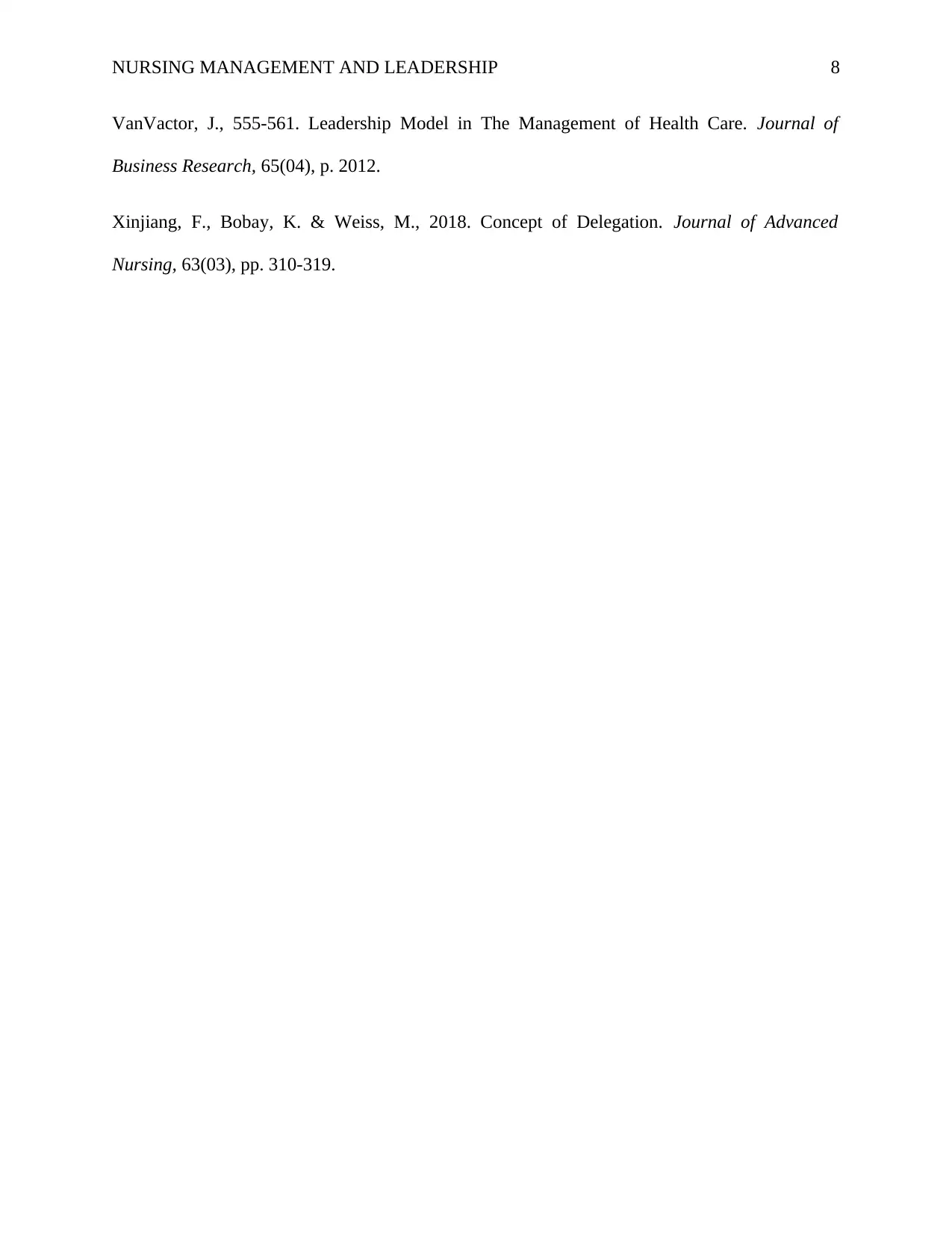
NURSING MANAGEMENT AND LEADERSHIP 8
VanVactor, J., 555-561. Leadership Model in The Management of Health Care. Journal of
Business Research, 65(04), p. 2012.
Xinjiang, F., Bobay, K. & Weiss, M., 2018. Concept of Delegation. Journal of Advanced
Nursing, 63(03), pp. 310-319.
VanVactor, J., 555-561. Leadership Model in The Management of Health Care. Journal of
Business Research, 65(04), p. 2012.
Xinjiang, F., Bobay, K. & Weiss, M., 2018. Concept of Delegation. Journal of Advanced
Nursing, 63(03), pp. 310-319.
⊘ This is a preview!⊘
Do you want full access?
Subscribe today to unlock all pages.

Trusted by 1+ million students worldwide
1 out of 9
Related Documents
Your All-in-One AI-Powered Toolkit for Academic Success.
+13062052269
info@desklib.com
Available 24*7 on WhatsApp / Email
![[object Object]](/_next/static/media/star-bottom.7253800d.svg)
Unlock your academic potential
Copyright © 2020–2026 A2Z Services. All Rights Reserved. Developed and managed by ZUCOL.





